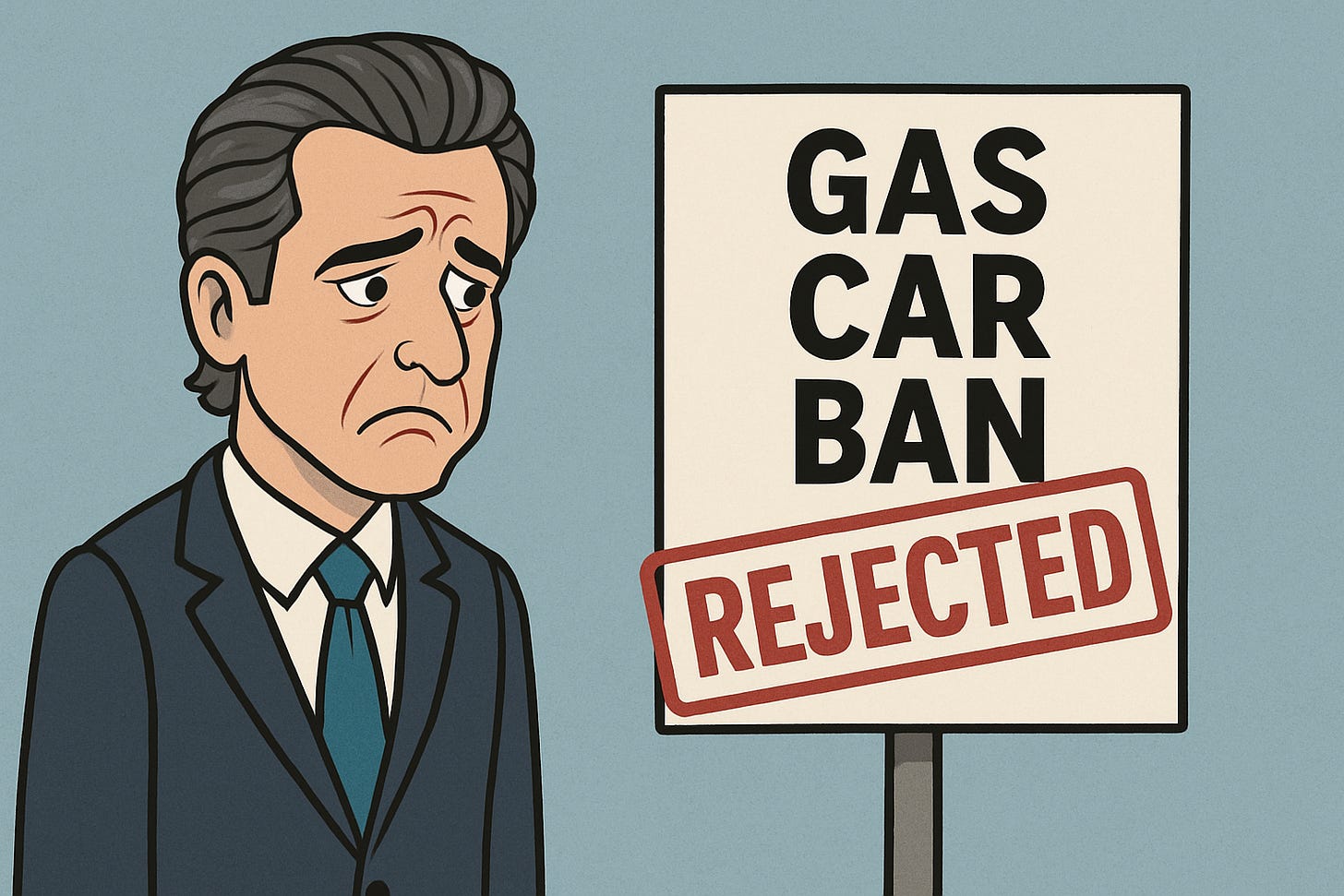Congress Kills California's 2035 Ban On Gas Powered Cars
Although the U.S. Supreme Court will likely get the last word…
California's Ambitious but Flawed Plan
California's 2035 ban on new gas-powered car sales, spearheaded by Governor Gavin Newsom and Sacramento Democrats, does not withstand scrutiny in terms of prudence or practicality. It's ideological overreach, grandstanding ahead of common sense. The House of Representatives, in a 246-164 bipartisan earlier this month, passed a resolution sponsored by Rep. Kevin Kiley (R-CA) to nullify the federal waiver that enabled this mandate. The Senate followed suit by a 51-44 vote yesterday morning. Requiring only a simple majority in both houses, this Congressional Review Act (CRA) resolution is now awaiting President Trump's signature, sparking controversy over state power, federal overreach, and the merits of sound policy. This fight will likely end up in the Supreme Court, where it could provide an opportunity to revisit a flawed idea.
California's Unique Authority
The Clean Air Act of 1970 grants California a special exemption, allowing it to set more stringent auto emissions standards than the federal government through an EPA waiver. No other state is given this exception, predicated upon California's long history of air pollution problems. California has received over 75 waivers, affecting 40% of the U.S. car market since 11 states adopted its rules. The Biden administration’s waiver, granted last December, included an aggressive phase-out; by 2035, 80% of new car sales must be electric. There is a significant uneasiness with California dictating national auto policy.
A Question of Federal vs. State Power
The Constitution empowers Congress to regulate interstate commerce, and California's rules, which impact a dozen states, constitute a de facto national standard. This is an overreach of states' rights—why should Californians' priorities force Ohioans or Texans to buy pricey electric vehicles (EVs)? The CRA resolution, sponsored by Congressman Kevin Kiley, is legally controversial. The Senate parliamentarian and the Government Accountability Office concluded that waivers aren't "rules" subject to CRA review, a conclusion that the Senate overruled in a procedural vote. Critics, including Newsom, lament this as "lawless." The State of California has already announced a lawsuit on the matter.
Economic and Practical Concerns
The policy is a gamble Californians cannot afford. EVs comprise just 25% of California's new car sales, which is far below the mandate's requirements. Charging stations are scarce, and electric vehicles (EVs) remain more expensive than gasoline alternatives. The transition promises economic hardship for families and automakers, accompanied by production challenges and job losses. California's high taxes and refinery regulations result in gas prices that are $1.68 per gallon higher than the national average, contributing to increased expenses for residents. Recent wildfires have released more carbon than California's emissions regulations have conserved, undermining its quixotic climate goals.
A Warning for National Policy – And National Voters
Not only is this a bad policy, but it also serves as a warning. In their single-state-in-a-single-nation quest to reduce global emissions, Newsom and Sacramento Democrats exact more cost from Californians for little planetary impact. Newsom's pragmatic rhetoric conceals an ideological streak that voters nationwide should scrutinize, particularly considering his White House ambitions. Newsom's gas-car ban is another example of an extreme policy that highlights his moderate posturing doesn't align with his actions. Such policies, prioritizing ideology over practicality, risk alienating voters who do not support such an extreme agenda.




Now if only California would vote some follow through and get serious people in office instead of power hungry Marxists. This State is in terrible shape and the population is basically ignorant of it's position. If we had Free and Fair elections that do not take weeks to conclude, we might get the change needed.